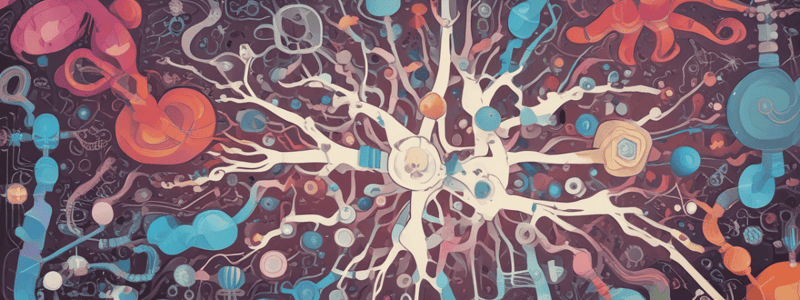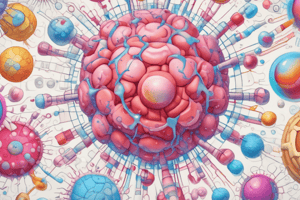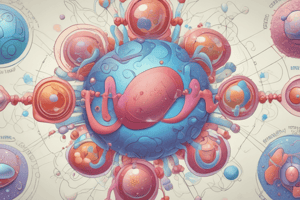Podcast
Questions and Answers
Which term refers to chemical substances that interact with a biological system to produce a physiological effect?
Which term refers to chemical substances that interact with a biological system to produce a physiological effect?
- Bioisosteres (correct)
- Transition state isosteres
- Receptor antagonists
- Isosteres
What is the key principle of lead optimization in medicinal chemistry?
What is the key principle of lead optimization in medicinal chemistry?
- Selecting random functional groups
- Focusing solely on pharmacokinetics
- Optimizing target interaction (correct)
- Avoiding any changes to the chemical structure
In drug-receptor interactions, what do bioisosteres mainly focus on?
In drug-receptor interactions, what do bioisosteres mainly focus on?
- Decreasing drug efficacy
- Increasing drug toxicity
- Modifying functional groups while retaining biological activity (correct)
- Enhancing drug solubility
Which type of isosteres mimic the transition state of a reaction rather than the substrate or product?
Which type of isosteres mimic the transition state of a reaction rather than the substrate or product?
What is the primary goal of using isosterism and bioisosterism in medicinal chemistry?
What is the primary goal of using isosterism and bioisosterism in medicinal chemistry?
Which text would be useful for referring to an overview presentation on relevant pages regarding medicinal chemistry?
Which text would be useful for referring to an overview presentation on relevant pages regarding medicinal chemistry?
What factor affects the affinity of a drug to its receptor by influencing the stereochemical fit and shape complementarity?
What factor affects the affinity of a drug to its receptor by influencing the stereochemical fit and shape complementarity?
Which term refers to the strength of binding of a single molecule to its ligand, typically measured by the equilibrium dissociation constant (KD)?
Which term refers to the strength of binding of a single molecule to its ligand, typically measured by the equilibrium dissociation constant (KD)?
What type of compounds produce a biological response by having affinity to their target but not activating the receptor?
What type of compounds produce a biological response by having affinity to their target but not activating the receptor?
Which chemical properties are involved in controlling the Drug-Receptor Interaction through non-covalent interactions?
Which chemical properties are involved in controlling the Drug-Receptor Interaction through non-covalent interactions?
Which term refers to the dissociation constant used to evaluate and rank the strengths of bimolecular interactions?
Which term refers to the dissociation constant used to evaluate and rank the strengths of bimolecular interactions?
Why do optical isomers act differently in biological systems?
Why do optical isomers act differently in biological systems?
What type of interaction do anticholinesterase agents have with enzymes at the active site?
What type of interaction do anticholinesterase agents have with enzymes at the active site?
Which process does Parathion undergo to inhibit acetylcholinesterase irreversibly?
Which process does Parathion undergo to inhibit acetylcholinesterase irreversibly?
What is the active metabolite of Parathion that is used for the treatment of glaucoma?
What is the active metabolite of Parathion that is used for the treatment of glaucoma?
What is the key principle in lead optimization when optimizing target interactions?
What is the key principle in lead optimization when optimizing target interactions?
In drug-receptor interaction, what is used to optimize access to the target in Prodrugs and drug optimization?
In drug-receptor interaction, what is used to optimize access to the target in Prodrugs and drug optimization?
Which type of agents interact non-selectively with all enzymes containing serine at the active site?
Which type of agents interact non-selectively with all enzymes containing serine at the active site?
Which type of bioisosterism involves the use of a double bond to position essential functional groups into a particular spatial arrangement?
Which type of bioisosterism involves the use of a double bond to position essential functional groups into a particular spatial arrangement?
In classical bioisosterism, replacement of OH by an amino group leads to the formation of which antimetabolite?
In classical bioisosterism, replacement of OH by an amino group leads to the formation of which antimetabolite?
Which group is often used as a bioisostere for an amide in drug design?
Which group is often used as a bioisostere for an amide in drug design?
What type of isosteres are utilized to design transition state analogues for enzyme inhibitors?
What type of isosteres are utilized to design transition state analogues for enzyme inhibitors?
Which atom or group is commonly substituted by fluorine due to similar van der Waals radii and electronegativity?
Which atom or group is commonly substituted by fluorine due to similar van der Waals radii and electronegativity?
What steric factor is considered less important when a sulfonamide group replaces a phenol hydroxy in catecholamines?
What steric factor is considered less important when a sulfonamide group replaces a phenol hydroxy in catecholamines?
Which type of covalent bonding leads to irreversible binding between a drug and a receptor?
Which type of covalent bonding leads to irreversible binding between a drug and a receptor?
In the context of bioisosteres, what does 'N C P + + As+' refer to?
In the context of bioisosteres, what does 'N C P + + As+' refer to?
What term describes the replacement of functional groups with other groups having similar properties?
What term describes the replacement of functional groups with other groups having similar properties?
What is the concept of isosterism applied to in drug design?
What is the concept of isosterism applied to in drug design?
What law accounts for similarities in groups having the same number of valence electrons?
What law accounts for similarities in groups having the same number of valence electrons?
Which of the following is NOT considered a classical bioisostere according to the text?
Which of the following is NOT considered a classical bioisostere according to the text?
What is a challenge mentioned in relation to relating physico-chemical properties to biological activity?
What is a challenge mentioned in relation to relating physico-chemical properties to biological activity?
Which functional group can be ionized at physiological pH, imposing a positive charge on the molecule?
Which functional group can be ionized at physiological pH, imposing a positive charge on the molecule?
In isosterism, what does the concept of ring equivalents refer to?
In isosterism, what does the concept of ring equivalents refer to?
'Bioisosteres' are defined as groups with near equal shapes, volumes, and electron distribution that exhibit similar what?
'Bioisosteres' are defined as groups with near equal shapes, volumes, and electron distribution that exhibit similar what?
'Chemical isosterism' was developed to describe similarities in physical properties based on what characteristic?
'Chemical isosterism' was developed to describe similarities in physical properties based on what characteristic?
What term describes replacing -CH=CH- in benzene with -S- or -O-?
What term describes replacing -CH=CH- in benzene with -S- or -O-?
Flashcards are hidden until you start studying
Study Notes
Absorption, Distribution, Metabolism, Excretion (ADME)
• Pharmacokinetics and pharmacodynamics are crucial in drug development • Lead discovery and optimization involve structure-activity relationships, binding interactions, and pharmacophores
Functional Group Modification: Isosterism
• Isosteric replacement: replacing functional groups with similar physical and chemical properties • Coined by Langmuir (1919) to describe similarities in physical properties (e.g., atoms with the same number of valence electrons) • Grimm's Hydride Replacement Law (1925) accounts for similarities in groups having the same number of valence electrons
Bioisosteres
• Groups or molecules with similar physico-chemical properties (shape, volume, electron distribution) having similar biological activity • Difficult to relate physico-chemical properties to biological activity, as many properties are involved simultaneously • Classical bioisosteres obey original conditions of Langmuir and Grimm • Non-classical bioisosteres do not obey steric and electronic definitions of classical bioisosteres
The Drug-Receptor Interaction
• A drug is a chemical substance that interacts with a biological system to produce a physiological effect • Drug-receptor interaction involves physical and chemical characteristics of drugs (e.g., solubility, surface activity, partition coefficient) • Target or receptor: a cellular macromolecule that a drug binds to initiate its effects (e.g., protein, nucleic acid, lipid, carbohydrate)
Factors Controlling the Drug-Receptor Interaction
• Steric factors (stereochemical fit; complementarity of shape) • Non-covalent interactions (electrostatic effects, hydrogen bonding, hydrophobic interactions, van der Waals or London Dispersion forces) • ADME processes (pharmacodynamics and pharmacokinetics)
Covalent Bonding and the Drug-Receptor Interaction
• Formation of a covalent bond between a drug and a receptor leads to irreversible binding (irreversible inhibitor) • High reactivity can lead to high toxicity, used only for prolonged effects (bactericides, anticancer, pesticides)
Transition State Isosteres
• A special type of isostere used to design transition state analogues • These drugs are enzyme inhibitors, mimicking the crucial features of the transition state but stable to enzymatic reaction
Studying That Suits You
Use AI to generate personalized quizzes and flashcards to suit your learning preferences.




